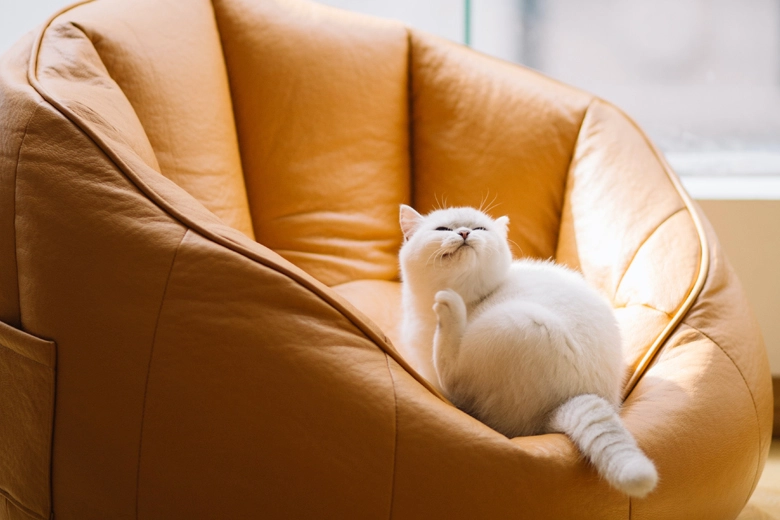Cats can beautifully enrich anyone’s life with hungry meows at 3 am and scream of distress when stuck in a most peculiar places. However, it can also add a lot of distress and confusion, especially when your favorite tuna magician has suddenly changed their behaviour and became lazy. In this article, we look at possible reasons why your kitty is less active and how cat parents can manage this new, and often hard to find solutions for, situation.
Reason #1
It’s a well-known fact that felines are world champions in sleeping. Cats can spend up to 18 hours daily on just sleeping and lazily watching over the house napping, which, believe it or not, is not the record. Cats experience different stages of sleep, and kittens might fall asleep even during the playtime. If your cat’s habits haven’t changed and you have not noticed other alarming signals, there is nothing to worry about. Even humans can wake up cranky and unhappy, or be even slow and unresponsive until they’ve had their coffee. Being the sole protectors of any households, cats especially need those very few hours of sleep.
Reason #2
Pay attention to the breed’s typical personality when choosing a cat, and consider which would fit best with your lifestyle and work/study schedule. Would you prefer to have a couch potato in your house or a bundle of energy? Some breeds, such as Ragdolls, are known for being very calm and laid-back, while others, like Bengals, are incredibly playful and energetic.
Reason #3
Your cat lying around all day doing nothing may be a sign of them getting older. As cats age, they tend to become less energetic and calmer.
Reason #4
Let’s be honest, if you are reading this, your cat is probably very spoiled. Fluffy balls are used to getting whatever they want whenever they want. A new scratching post because the old one smells funny? Drinking tap water near you when five minutes ago they run away from ear scratches? As a result, cats have no motivation to do anything.
To keep your cat engaged and stimulated, introduce more playtime into their daily routine. Rotate toys regularly to avoid boredom, and observe what specific toys your pet favors. Playtime should consist of two types: solitary play with toys like a small fur mouse or a catnip-filled banana, and interactive play with you or other family members. If your cat needs extra motivation, find the optimal time window for playtime when they are most energetic, and identify the special toy that excites them the most. Both solitary and interactive play sessions are crucial for a cat’s physical and mental well-being, helping to satisfy their natural hunting instincts and providing opportunities for exercise and bonding.

Reason #5
Your cat might be overweight, and this can lead to a reduced activity level.
The study looking at the behavior of nearly 200 cats found that felines with obesity were more likely to spend less time moving around and more time lying down. The researchers suggest that this could be because obese cats feel uncomfortable and try to avoid movement in order to protect their joints. If this sounds familiar, and you can see your cat looking a little bit chubbier than they should be, talk to your vet, discuss your concerns, and find the best weight loss dieting formula for your cat.
Reason #6
According to the study published in the Journal of Veterinary Behavior, there may be a link between laziness in cats and health problems. If your pet has suddenly become lazy with no warning or explanation, and you have also noticed other alarming signals such as increased drinking or urinating, or decreased appetite, it could be a sign of underlying cat diseases. Sudden behavioral changes in cats can be associated with health problems such as dental issues, severe dehydration, overall pain, anxiety, liver or kidney disease, diabetes, thyroid problems, heart disease, cancer, and more. If your cat exhibits such concerning symptoms, take them to the veterinarian for a comprehensive check-up to rule out any serious cat diseases that may be causing their sudden lack of energy.
FAQ
There are several potential reasons why a cat may suddenly become lazy and inactive: a) illness or disease b) pain or injury c) stress or anxiety d) boredom or lack of stimulation d) medication side effects e) age
Yes, boredom and a lack of physical and mental stimulation can absolutely contribute to a cat’s laziness and inactivity. Cats are naturally curious, intelligent animals with a strong instinct to hunt, play, and explore. If their environment doesn’t provide enough opportunities for these behaviors, they can become bored, understimulated, and lazy as a result.
Yes, certain medications and their side effects can contribute to sluggishness in cats. If you notice a significant change in your cat’s energy levels after starting a new medication, it’s always a good idea to consult your veterinarian, as they may be able to adjust the dosage or recommend an alternative drug with fewer sedating effects.
There are several environmental factors and changes that could contribute to lazy behavior in cats: a) changes in routine b) new household members c) relocation d) conflicts with other pets e) stressful events
Yes, cats can absolutely have lazy days just like humans.
Why is my cat lazy—final thoughts
By understanding the reasons behind their feline friend’s laziness, cat parents can strive to provide the best possible environment and care to keep their pet healthy, active, and engaged for as long as possible.
*FTC Disclosure: This page contains affiliate links. If you make a purchase after clicking on the links, Meowpassion will get a small commission at no extra cost to you. We are dedicated to finding the coolest products for cats, cat owners and lovers, and we never recommend anything that we don’t love or trust.

